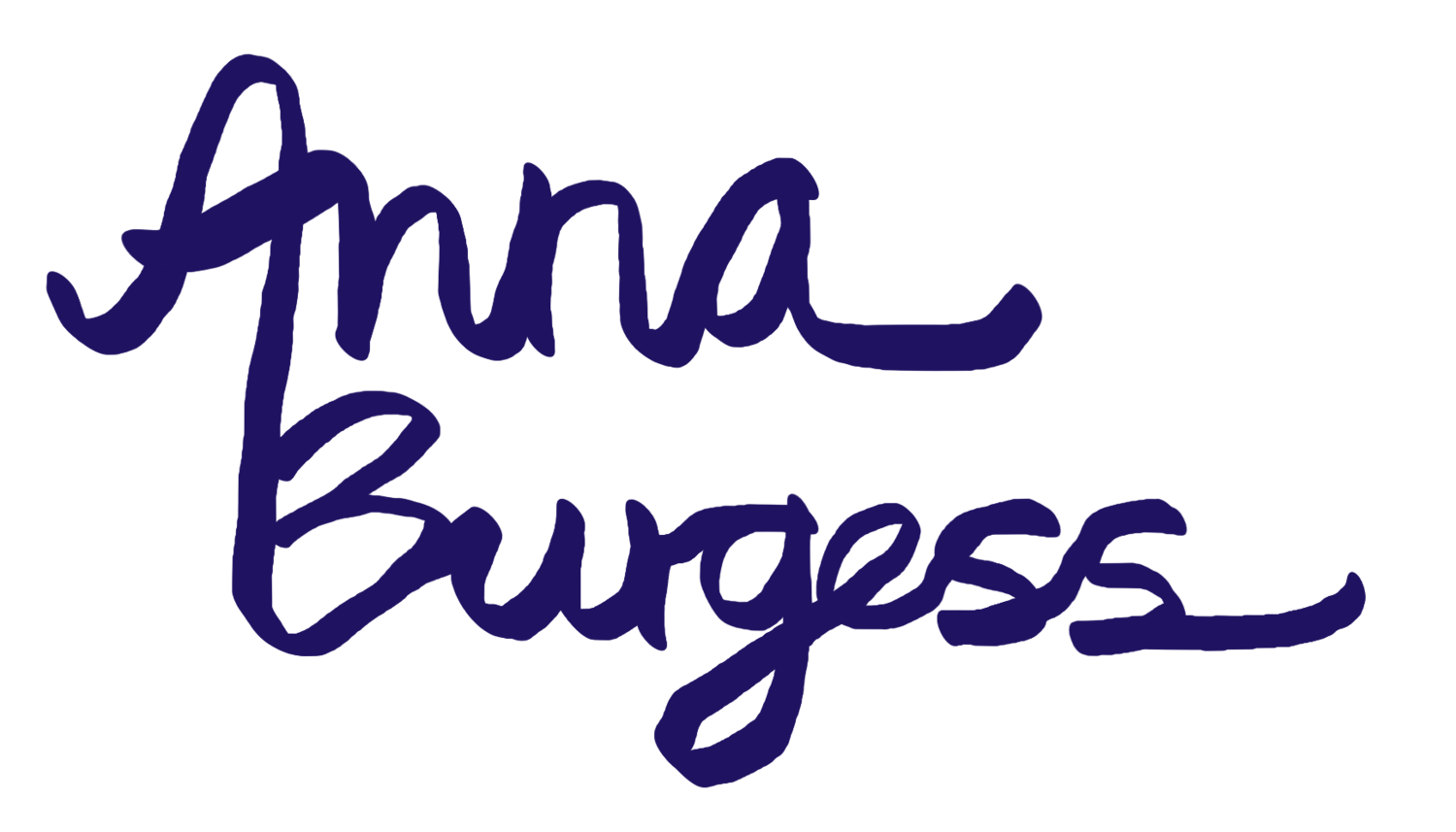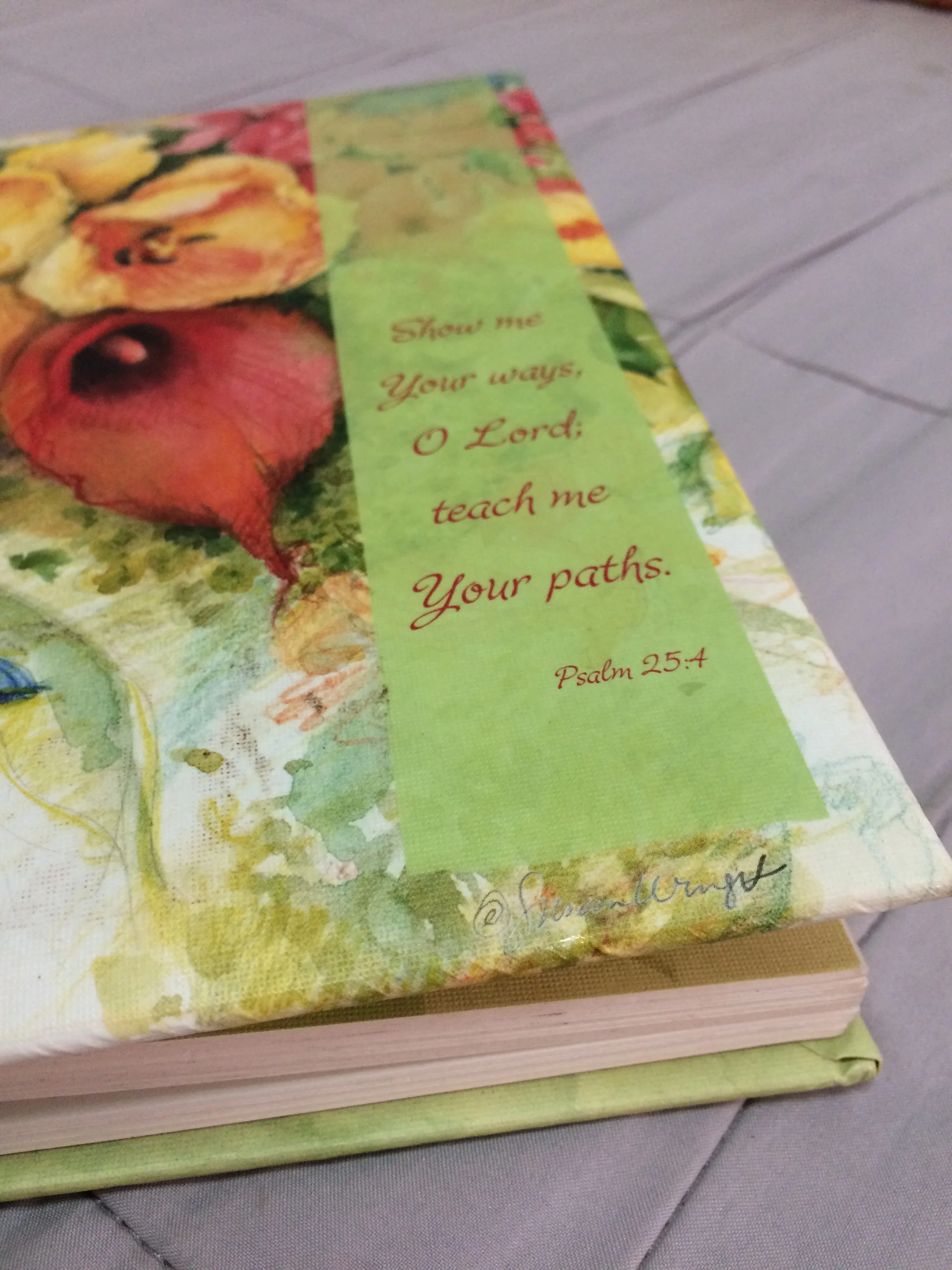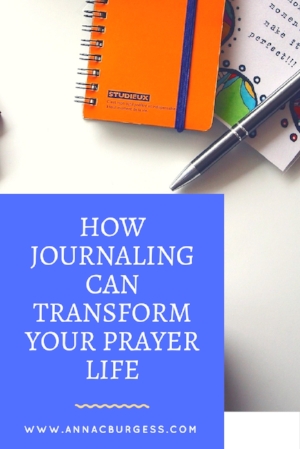How journalling transformed my prayer life
Nobody mentioned writing down prayers much when I was a child. If they did it was somewhere along the lines of: if you struggle to pray, you could always write your prayers down. It felt like it was a weakness and a crutch to write down your prayers: no one ever said this but somehow I had internalized the lie that those people who pray well, pray out loud or in their minds; and those who write their prayers down are prayer-disabled (but at least praying!).
The problem was that I found praying in my head or out loud was okay for a few seconds or minutes, but the flow always got interrupted by something. I found it difficult to stay on track. When I began to realize that writing down my prayers was a totally valid way to pray I realized that journalling wasn’t a crutch, but rather wings to my prayer life! Suddenly I could stay focused!
So yes, I do pray out loud with others, I do pray short prayers throughout my day, I do talk to God in the middle of the night when I can’t sleep, but when I want to pray in a focused way in my quiet time I find journalling to be the best tool for me.
What is journalling prayer?
Journalling prayer in its simplest form is prayer written down. It is like a written form of communication, sometimes a letter, between me and God. It may be an Psalm-like letter of praise or frustration. It may be bullet points of thankfulness or working out feelings to give to God. It may follow a pattern or it may just flow as I feel led by the Spirit.
What patterns are there?
As a child I was taught two acronyms to help with prayer: TSP and ACTS.
TSP - Thanksgiving, Sorry, Please
ACTS - Adoration, Confession, Thanksgiving, Supplication
Earlier this year I followed Beth Moore’s Whispers of Hope prayer devotional for 60 days. It was life transforming for me and I still use the pattern laid out there to prayer journal today. I highly recommend the devotional if you want to start prayer journalling or if you want a boost to your prayer life. She uses the PRAISE method of prayer:
P - Praise - focusing on who God is and praising Him for it
R - Repentance - turning from sinful habits and thoughts
A - Acknowledgement - acknowledging who is truly Lord of the different areas of your life
I - Intercession - prayers for others
S - Supplication - prayers for yourself
E - Equipping - allowing the Holy Spirit to bring Scriptures and words to mind to encourage
(Thanksgiving is not mentioned here as a separate letter because she says, it should happen in the different areas.)
I found this method to be very complete and life-transforming because it gave me outlet for all the different things I wanted to pray about - it helped drop the anxiousness about not praying enough or forgetting different things. I found all of the sections helpful in different ways:
Praise
Starting with God is the best place to start! Everything else is put into perspective when we see how big and great He is first. It is also an opportunity to reflect on and praise Him for answered prayers.
Repentance
Having a specific daily time to repent rather than just repenting as prompted by the Holy Spirit means that I quickly identify and put an the end to sinful thoughts and habits that were just beginning before they blew up, as well as began dismantling in-grained sinful thoughts and habits, asking God for His help to overcome. When I then faced the temptation of those thoughts and habits during the day I remembered the prayer and asking for God’s help and had greater faith to face those temptations.
Acknowledgement
I didn’t really understand why ‘acknowledgement’ was in there aside from ‘praise’ other than to make the acronym work at first, but this area soon became life-changing too. At the beginning I realized how hard it was to give over all the different areas of my life to God - I was surprised how many of the areas of my life I held onto and how I didn’t necessarily trust He would do a better job than me at them(!). Daily acknowledging that He was Lord over my kids, over my ministry, over my writing, over my future etc. was humbling and faith-growing in ways I never expected.
Intercession
Having a set space to intercede for others meant that all those Facebook or email prayer requests or different times people had asked for prayer actually happened more than a quick ‘Lord, I pray for so-and-so, bless them’ breathe prayers.
Supplication
Writing out requests meant that I grew in faith that God would answer them. For example, if I had prayed for grace to face a difficult relationship, when it came to the need I would remember that I had already prayed for it and so I expected an answer - I had more faith. Going back later and seeing how many of the prayers had been answered was encouraging too.
Equipping
Having a time of listening to what God wanted to say about the different things I had prayed about truly equipped me for the day - He spoke Scriptures I could hold onto during the day and inspired thoughts came to mind about the things I was praying about - He might tell me not to worry, for example. A big ‘impression’ I remember back earlier in the year was that I felt Him telling me that the house we were buying for the church would not happen as quickly as I expected it to. That gave me patience when it took 9 months and faith to believe it would actually happen in the end so not to give up hope! Small or big, the ‘equipping’ area helped me to see things from His perspective more and more.
Is Journalling prayer for everyone?
Journalling prayer has transformed my prayer life and I think that it is something that is worth trying for everyone who can. Even children who can’t yet write can journal using pictures and different marks. Journalling is often considered more of an introverted activity, but I know several extroverts who have said that writing is very helpful for them too because it helps them to process on paper rather than just in their heads which they often find difficult. Why don’t you give it a go? If doing a whole process like the PRAISE process seems to overwhelming, why don’t you just try by writing a letter to God about what is on your mind and then leaving some space afterwards to write down scriptures or thoughts you feel the Holy Spirit may be saying to you about those things. Writing helps us to flow without constantly questioning if it is really God speaking or not and then we can go back and weigh what we have written against Scripture and the character of God.
“Trust in him at all times, you people; pour out your hearts to him, for God is our refuge.”
Highly recommend Beth Moore's Whispers of Hope prayer devotional. There is space to write inside, so it is best to get the print version, although you could use the kindle version with your own notebook alongside.
Thank you for taking the time to read this post. Please share it with anyone you think would find it helpful!
I have noticed a correlation between my anxiety and the amount of time I spend in listening prayer. The less time I spend in silence, in meditation, or in journalling the whispers of the Holy Spirit, the more anxious I become. The busier I get and the less time I make to hear what God has to say about what I am doing, the more concerned I become about whether or not I am doing the right things with my time. It leads to stress which ends out being taken out on those closest to me, even though it is not my intention.
Listening prayer can be any form of prayer that causes us to be aware of God’s presence with us. It can take different forms, but it is a form of prayer that doesn’t involve doing in so much as being. It is a receiving prayer, a dwelling with God prayer, an intimate form of prayer.
Contemplative prayer
Also known as “resting in God” or “soaking” in more charismatic circles, contemplative prayer is when we sit or lay before God, focusing our minds on Him or on a word or Word of Scripture. We might take a word like “holy” or “beloved” and sit with that word for sometime, allowing God to bring to mind different elements of Him connected with those words. We might listen to Christian music or remain silent, but the focus is on leaving the distractions of the day and turning our hearts and minds towards God. Sometimes it can be helpful to have a notebook to write down those things that come up - whether they be distracting thoughts about our day which we can come back to later - or thoughts that have come to mind as we connect with God.
Lectio Divina
This is a form of contemplative prayer where a short passage (usually Scripture) is read slowly (and sometimes repeated several times with gaps of a minute or so between reading). As the passage is read and in the silence that follows, we quieten our hearts and allow the Holy Spirit to speak to us through the passage or a particular word or phrase in the passage.
Journalling
I talked about journalling and how it transformed my prayer life in an earlier post this month. When I first began to discern God’s voice one way I found particularly helpful was to journal love letters. I would write a letter to God and then I would quiet myself before God, focus on Jesus (Hebrew 12) and then write a letter back from God to me. Writing it down allowed me to flow without constantly worrying if it was God or not. When I had finished writing I could then go back and line up what I had written with Scripture and weigh any directional thoughts I had with others. Journalling helped me to learn what God’s voice sounded like for me personally.
Practicing the Presence of God
Brother Lawrence, a French monk from the 1600s wrote a short book (which is worth a read!) called The Practice of the Presence of God. In this book he wrote about how he endeavored to call God’s presence to mind as often as he could though out the day - whilst washing up and serving the monastery and going about other daily tasks. His aim was to have a continued flow of relationship with God throughout the day.
This is something we have to be intentional about and yet also be willing to fail constantly at to get better at! Consciously recognizing and calling to mind God’s presence during the day is a blessing and something we must not feel bad about forgetting to do, but keep returning to whenever we remember. Setting an alarm or having a particular meeting place (like at the kitchen sink or in the bathroom!) can be helpful reminders. When I wake up I try and take a moment before the day or my quiet time starts to greet Jesus and call to mind His presence with me. It is like a spiritual embrace first thing in the morning which I try to return to throughout the day. It doesn’t need to take long - just stopping and calling God’s presence to mind can take all of 10 seconds but it makes a huge difference to our outlook on the day.
Another practical way I have also tried to get into a habit of practicing God’s presence is before I buy something. Because the committed money we have coming in each month is less than our monthly budget, we have to spend and give by faith - trying to hear what God wants us to do with the money that comes in until God makes up the rest (which He always does some way or another!). On rare occasions (like once a year!) when a larger amount comes in, we may have more than we need for that month. In those months we have to hear if God has something in particular that He wants us to spend or give the extra money to or if it is to be saved for the next month!
One simple thing I try and do before I buy something online or in the store is stop and ask the Holy Spirit if I should buy it - sometimes it is obvious, but sometimes it is not. Even though I know I ‘need’ something, sometimes the Holy Spirit has told me to ‘wait’. One example was actually a prayer journal. I was coming to the end of one and I knew I needed another one so when I was in the shop I wanted to buy another one. I felt the Holy Spirit telling me I would not need it, (I felt an uneasiness in my spirit) but I bought one anyway. The next week we had a team come and one of the ladies on the team gifted me a journal! I smiled because I now understood God’s prompting, but as God is gracious and the Redeemer I was also able to gift the journal I had bought to someone else!
And that is the point - learning to hear God’s voice is not meant to paralyze us. I am not saying we should never buy anything without first asking God or be paralyzed by what to wear in the morning until God speaks, but what I am saying is that there is a level of intimacy which we can develop with God where He will speak into the details of our lives and guide us if we ask. I don’t ask God what to wear each morning (I live in a desert where the climate is very predictable), but there have been times when I have felt the Holy Spirit tell me not to wear something or to wear something and I haven’t understood until later why. The only way we learn to develop this type of listening prayer is being open to hearing Him speak in our thoughts, guided by His peace.
Resting in the Lord
There have been many afternoons or before an evening meeting that I have been exhausted and managed to get half an hour rest before I get going again. In those times I often put on some worship music and just rest in the Lord. I don’t come with an agenda - I just recognize His presence and ask Him for His peace to flood over me. I may sleep or I may not, but either way I experience rest and communion with God. Often in those half-awake, half-asleep rest times I have visions or dreams where God speaks into situations I have been wondering about and I awake refreshed and renewed.
These are just some examples of listening prayer. How can you set some time aside this week to intentionally be mindful of God’s presence this week and listen to what He has to say to you?
My sheep listen to my voice; I know them, and they follow me.
— John 10:27
I have put together a guide for you with 8 fresh, practical ways that you connect with God in 10 minutes or less. May it help you be attentive to where God is wooing you today! Click the image below to get your free copy now:















